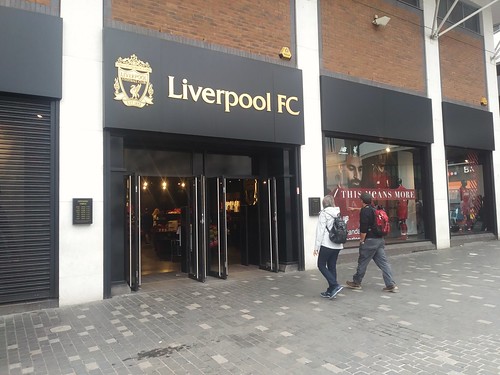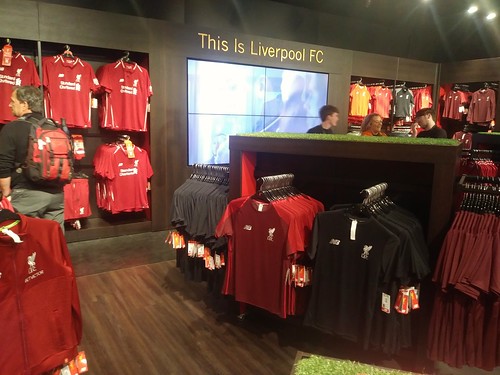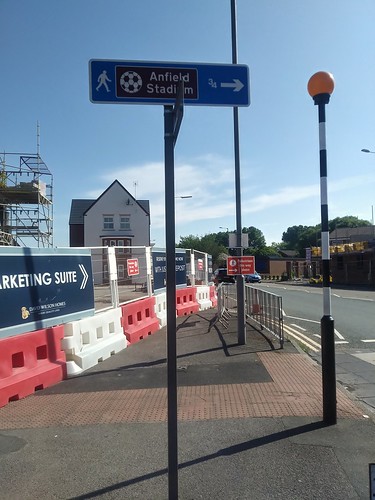Sports teams as an element of city brand identity
I have had a lot of bias against "sport teams as an element of community identity" partly because of how this sentiment is "appropriated" by team owners to extract extranormal financial benefits from communities ("How American sports franchises sell cities short," Guardian), but also because it's hard to see a real return on investment.
 Liverpool Football Club has a number of retail stores, not only in Liverpool, befitting the internationalization of the team. This store is in St. John's Center, a major shopping district in the heart of the city.
Liverpool Football Club has a number of retail stores, not only in Liverpool, befitting the internationalization of the team. This store is in St. John's Center, a major shopping district in the heart of the city.But in person in Liverpool last week made me reassess this in terms of a city and its identity and brand, and the impact on the city's "brand," locally, within the UK and internationally, from the Liverpool Football Club is considerable ("Liverpool ranked the sixth most powerful brand in world football," Liverpool Echo). But Everton, its intra-city competitor (and the stadiums are close to each other), is ranked #13.
-- "Football clubs as symbols of regional identities," Soccer & Society (2015)
-- "The historical significance of Locality and Regional Identity to Football," chapter, Routledge Handbook of Football Studies
-- "The globalization of football: a study in the glocalization of the ‘serious life’," British Journal of Sociology (2004)
 The LFC retail store is a sporting goods store devoted to soccer. Perhaps more teams and arenas need to develop more focused retail operations, e.g., with the Capitol One Arena, it could focus on the four teams owned by the group--two for basketball, the Wizards and the Mystics, hockey--the new Stanley Cup champs, the Washington Capitals, and the group's launching of an arena football team.
The LFC retail store is a sporting goods store devoted to soccer. Perhaps more teams and arenas need to develop more focused retail operations, e.g., with the Capitol One Arena, it could focus on the four teams owned by the group--two for basketball, the Wizards and the Mystics, hockey--the new Stanley Cup champs, the Washington Capitals, and the group's launching of an arena football team.Last night's Stanley Cup championship game drew lots of people to the Capitol One Arena area--the Washington Capitals broadcast the game in the arena and on video screens on the building as the game was played in Las Vegas. And the team even paid for extended Metrorail service ("Monumental Sports keeping Metro open late Thursday," Washington Business Journal) which is unprecedented because it wasn't for a live game, but a live broadcast.
People in Chinatown celebrating the Stanley Cup victory by the Washington Capitals.
Insane...from 4th floor window pic.twitter.com/YES9ybTb2L— DavidDunn (@ImDavidDunn) June 8, 2018
It's exciting to see that many people out on the streets around the arena.
There is a CityLab article, "Sports really can save a city," about how sports as entertainment and business can be a good business for cities, using Indianapolis as an example.
Reconsidering the issue via the article, it makes the point that the focus in Indianapolis was larger, and included a variety of sports-related initiatives, not just a particular event or sports team:
Indianapolis civic leaders first decided to take what already attracted people to their city – sports entertainment – and enlarge and expand it go beyond merely one annual event.FWIW, Richmond has done something similar but scaled to its smaller size.
-- "More need for economic revitalization planning/linkage with sports stadiums: Las Vegas (+ Houston and the Super Bowl)," January 2017
-- "Better understanding of how to benefit from sports tourism," January 2018
So it's really about what I have been calling "Transformational Projects Action Planning," applied to sports as a line of business in economic revitalization and identity planning for a community.
But the typical focus (and even the article doesn't make the point strongly enough) on teams fails to make adequately the focus on a sports and economic development program in the TPAP mold, versus focusing on a specific team or "sports" more generally without much nuance. What made the difference for Indianapolis was visionary economic and capital planning of multiple projects within a larger plan, using sports as the fulcrum.
 Speaking of this and my trip to Liverpool, I asked people at a bus stop if what appeared to be a park was Everton Park, which I only knew about because I read the "Friends of Everton Park" newsletter on the community board of a local coffee shop, they said yes, but asked me where I was from, and one of the people on hearing "Washington, DC," asked me about DC United, the local soccer team.
Speaking of this and my trip to Liverpool, I asked people at a bus stop if what appeared to be a park was Everton Park, which I only knew about because I read the "Friends of Everton Park" newsletter on the community board of a local coffee shop, they said yes, but asked me where I was from, and one of the people on hearing "Washington, DC," asked me about DC United, the local soccer team.I mentioned the team's new stadium will be opening in a couple months, but I wasn't able to talk with him about any specifics of the team in terms of players, strategies, win-loss record, etc.
I stayed in an Airbnb that happened to be about one mile from Anfield Stadium, home of Liverpool FC, and the proprietor gets a number of visitors who come to the city to see matches.
Even, not unlike how people went to Capitol One Arena last night although the game was out of town, when the team played in Kiev recently. Someone stayed there from Portland Oregon, a fan who wanted to share the city's excitement over the team being in the UEFA Champions League final.
Labels: branding-identity, city-regional branding, sports and economic development




2 Comments:
yeah that is exactly the sort of store I was talking about in Madrid as well.
Perhaps the sponsorship deals and whatnot prevent teams from going down that path in the US. Seems like a very easy win.
In terms of branding, yep, sports matters.
when I saw it, I immediately thought of our exchange on this before.
And the difference between having a Modell's versus a very team focused store like the LFC example.
And because their brand value extends beyond the community, they are able to sustain stores outside of the Liverpool region, such as in Dublin (!) ... Dublin!
I didn't write this in the piece, but I was thinking of this in terms of Monumental the parent firm, and they could do either team only stores, or a combined one: Capitals; Mystics; Valor; Wizards.
DK if MSG does this with Rangers-Knicks.
Because the teams don't have the kind of individual brand value of an LFC, Real Madrid, Barcelona, Manchester United etc. maybe a combined store makes the most sense.
Similarly, you could do a store that was just of the sports teams in a city.
And of course, the same goes for college teams, e.g., how UMBC got a lot of brand value and sold a lot of merchandise.
But since Georgetown plays at Capitol One Arena, you could include that too as an element of a more focused brand store.
Post a Comment
<< Home